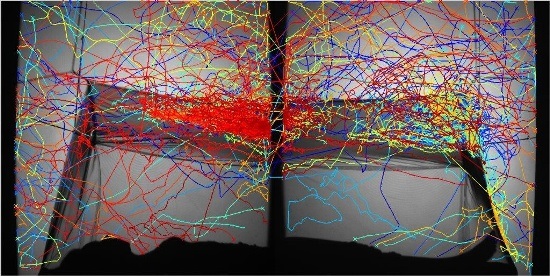Sep 3 2015
New research from LSTM has revealed precisely how insecticide-treated bed nets are so effective against malaria mosquitoes.
Communities in the poorest countries are the most vulnerable to malaria and 90% of all malaria deaths occur in Africa. Safe, simple and affordable, long-lasting insecticidal bed nets (LLINs) are very effective in preventing malaria and have played a major part in reducing malaria deaths in Africa by over 50% since 2000 (WHO). However, as very little is known about how mosquitoes interact with nets or how LLINs do their job so effectively, how they might be modified or improved is not clear. With malaria mosquitoes rapidly becoming resistant to the pyrethroid insecticides used on LLINs, their future is under threat and the need to understand the mode of action has never been more important.

LSTM vector biologists Dr Philip McCall and Ms Josie Parker worked with optical engineers Prof David Towers, Dr Natalia Angarita and Dr Catherine Towers from the University of Warwick’s School of Engineering to develop infrared video tracking technology that follows individual mosquitoes in flight as they try to reach a human sleeper inside a bed net. This system allowed the scientists to measure, define and characterise in fine detail, the behavioural events and sequences of the main African malaria vector, Anopheles gambiae, as it interacts with the net. Funded as part of the €12M AvecNet research consortium, the team’s initial results are published today in the journal Nature Scientific Reports.
Dr Philip McCall, senior author on the paper, said:
Essentially, the results demonstrated that an LLIN functions as a highly efficient, fast-acting, human-baited insecticidal trap. LLINs do not repel mosquitoes - they deliver insecticide very rapidly after the briefest contact: LLIN contact of less than 1 minute per mosquito during the first ten minutes can reduce mosquito activity such that after thirty minutes, virtually no mosquitoes are still flying. Surprisingly, mosquitoes were able to detect nets of any kind while still in flight, allowing them to decelerate before they ‘collided’ with the net surface.
The use of this innovative approach to mosquito behaviour has provided unprecedented insight into the mode of action of our most important tool for preventing malaria transmission, under conditions that are as close to natural as possible. The findings potentially could influence many aspects of mosquito control, ranging from how we test mosquito populations for insecticide resistance to the design of a next generation of LLINs. An MRC Confidence in Concept grant has funded the team to use the tracking system to explore a number of novel LLIN designs, already patented as an outcome from the current research.
The tracking system also has been deployed in a rural Tanzania, results of which will be reported shortly. The team recently was awarded £0.9M support from the Medical Research Council (MRC) for the next stage of this project, where they will use a larger three-dimensional system to track mosquitoes throughout the entire domestic environment, in experimental houses in Tanzania.
Dr McCall continued:
Preliminary results in field tests indicate that these laboratory findings are consistent with behaviour of wild mosquito populations which is very encouraging. We are at the early stages of this research, but we hope that our findings, and the use of this cutting edge technology, can contribute to the development of new and advanced vector control tools that will continue to save lives in endemic countries throughout the world.